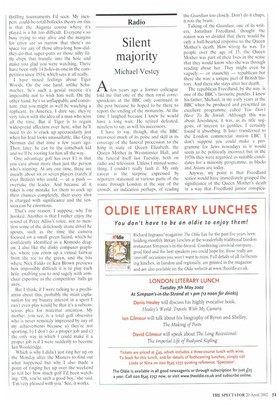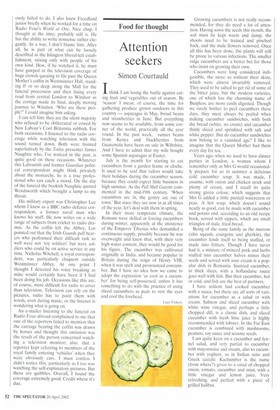Radio
Silent majority
Michael Vestey
Afew years ago a former colleague told me that one of the then royal correspondents at the BBC only continued in the post because he hoped to be there to report the ending of the monarchy. At the time I laughed because I knew he would have a long wait. He retired defeated, needless to say, as will his successors.
I have to say, though, that the BBC recovered much of its poise and skill in its coverage of the funeral procession to the lying in state of Queen Elizabeth, the Queen Mother in Westminster Hall, and the funeral itself last Tuesday, both on radio and television. Unless I missed something, I couldn't really fault it. My only caveat is the surprise expressed by reporters stationed at various parts of the route through London at the size of the crowds, an indication perhaps, of reading
the Guardian too closely. Don't do it chaps, it rots the brain.
Talking of the Guardian, one of its writers, Jonathan Freedland, thought the nation was so divided that there would he only a half-hearted response to the Queen Mother's death. How wrong he was. To people over the age of 15, the Queen Mother was part of their lives in the sense that they would know who she was through reading about her. They might even be vaguely — or staunchly — republican but there she was: a unique part of British history. And there she stays after her death.
The republican Freedland, by the way, is one of the BBC's favourite pundits. I knew his father, Michael, in my early years at the BBC when he produced and presented an excellent programme called You Don't Have To Be Jewish. Although this was about Jewishness, it was, as its title suggests, of interest to gentiles. I certainly found it absorbing. It later transferred to the London commercial station LBC. I don't suppose you could make a programme for Jews nowadays as it would seem to be politically incorrect hut in the 1970s they were regarded as suitable candidates for a minority programme, as blacks and Asians are today.
Anyway, my point is that Freedland senior would have immediately grasped the significance of the Queen Mother's death in a way that Freedland junior conspicu ously failed to do. I also knew Freedland junior briefly when he worked for a time on Radio Four's World at One. Nice chap, I thought at the time; probably still is. He has the ability to write nonsense rather elegantly. In a way, I don't blame him. After all, he is part of what can be loosely described as the Islington liberal-left establishment, mixing only with people of his own kind. How, if he watched it, he must have gawped at the television coverage of huge crowds queuing to file past the Queen Mother's coffin in Westminster Hall, standing 15 or so deep along the Mall for the funeral procession and then lining every road from central London to Windsor as the cortege made its final, deeply moving journey to Windsor. 'Who are these people?' I could imagine him asking.
I can tell him: they are the silent majority who refused to be obliterated or cowed by New Labour's Cool Britannia rubbish. For both occasions. I listened to the radio coverage while watching television with the sound turned down. Both were fronted superlatively by the Today presenter James Naughtie who, I've noticed in the past, is quite good on these occasions. Whatever this Labourish and former Guardian political correspondent might think privately about the monarchy, he is a true professional who can catch a mood. On the day of the funeral the bookish Naughtie quoted Wordsworth which brought a lump to my throat.
His military expert was Christopher Lee whom I knew as a BBC radio defence correspondent, a former naval man who knows his stuff. He now writes on a wide range of subjects from cricket to radio dramas. As the coffin left the Abbey, Lee pointed out that the Irish Guards pall bearers who performed their difficult task so well were not 'toy soldiers' but were soldiers who could be on active service at any time. Nicholas Witchell, a royal correspondent, was particularly eloquent outside Westminster Abbey. At one point I thought I detected his voice breaking as mine would certainly have been if I had been doing his job. Occasions like this are, of course, more difficult for radio to cover than television. Television can rely on the pictures, radio has to paint them with words, even during music, or the listener is wondering what is going on.
An e-mailer listening to the funeral on Radio Four abroad complained to me that one of the reporters failed to mention that the carriage bearing the coffin was drawn by horses and thought this omission was the result of the person concerned watching a television monitor; also, that a reporter kept referring to members of the royal family entering 'vehicles' when they were obviously cars. I must confess I didn't notice this, particularly as I too was watching the self-explanatory pictures. But these are quibbles. Overall, I found the coverage extremely good. Credit where it's due.







































































 Previous page
Previous page